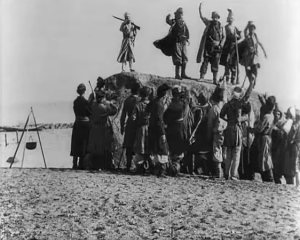Directed by: Vladimir Romashkov
Much like Italy’s La Presa di Roma / The Capture of Roma (1905), Russian cinema kicks off with a historic film. It features the titular Cossack leader who in 1670-1671 led an uprising against nobility in southern Russia. Rather than attempt to chronicle his life and/or major battles, the film focuses on one specific event in folklore – the drowning of a Persian princess. The validity of this event have been contested by contemporary historians and the source material for the film was largely a folk song (which, in turn, was based on a poem written in 1883 by Dmitry Sadovnikov). At the time the film came out, the song was still popular and very much in the consciousness of the public. As such, the film assumes some familiarity with the subject matter. Therefore, a version of the lyrics:
| Из-за острова на стрежень, На простор речной волны, Выплывают расписные, Острогрудые челны. На переднем Стенька Разин, Обнявшись, сидит с княжной, Свадьбу новую справляет, Сам весёлый и хмельной. Позади их слышен ропот: Нас на бабу променял! Только ночь с ней провозился Сам наутро бабой стал . . . . Этот ропот и насмешки Слышит грозный атаман, И он мощною рукою Обнял персиянки стан. Брови чёрные сошлися, Надвигается гроза. Буйной кровью налилися Атамановы глаза. “Всё отдам не пожалею, Буйну голову отдам!” — Раздаётся голос властный По окрестным берегам. А она, потупя очи, Не жива и не мертва, Молча слушает хмельные Атамановы слова. “Волга, Волга, мать родная, Волга, русская река, Не видала ты подарка От донского казака! “Чтобы не было раздора Между вольными людьми, Волга, Волга, мать родная, На, красавицу возьми!” Мощным взмахом поднимает Он красавицу княжну И за борт её бросает В набежавшую волну. “Что ж вы, братцы, приуныли? Эй, ты, Филька, чёрт, пляши! Грянем песню удалую На помин её души!..” Из-за острова на стрежень, На простор речной волны, Выплывают расписные Острогрудые челны. | From beyond the wooded island To the river wide and free Proudly sail the arrow-breasted Ships of Cossack yeomanry. On the first is Stenka Razin With his princess by his side. Drunk, he holds a marriage revel, Clasping close his fair young bride From behind there comes a murmur: “He has left his sword to woo; One short night and Stenka Razin Has become a woman, too.” Stenka Razin hears the murmur Of his discontented band And the lovely Persian princess He has circled with his hand. His dark brows are drawn together As the waves of anger rise, And the blood comes rushing swiftly To his piercing jet-black eyes. “I will give you all you ask for, Head and heart and life and hand!” And his voice rolls out like thunder Out across the distant land. And she, lowering her eyes, Not alive nor dead is she, Silently listens to the cries of the Ataman groggy. “Volga, Volga, Mother Volga, Wide and deep beneath the sun, You have ne’er seen such a present From the Cossacks of the Don! “So that peace may reign for ever In this band so free and brave, Volga, Volga, Mother Volga, Make this lovely girl a grave!” Now, with one swift mighty motion He has raised his bride on high And has cast her where the waters Of the Volga roll and sigh. “Dance, you fools, and let’s be merry. What is this that’s in your eyes? Let us thunder out a chanty To the place where beauty lies!” From beyond the wooded island To the river wide and free Proudly sail the arrow-breasted Ships of Cossack yeomanry. |
In the story of the lyrics, Stenka Razin overhears his men emasculate him and chooses to prove himself by sacrificing his bride to the river. The film, however, opts for a conspiracy by his men to get him drunk and inflame his jealousy with a falsified letter from the princess to a Persian lover. The outcome is the same – the princess is cast in the river.
As was typical for the time, the film employed a wide shot to tell the story. On one hand, it resulted in interesting shots such as the opening where waves of the river dominate the screen and set the tumultuous and unpredictable tone of the film. On the other hand, there are moments that would have benefited from a medium shot or close-up, such as the men getting Stenka Razin drunk. That said, it is an impressive start and Russian cinema would make significant contributions to film history in the years to come.

Bibliography
IMDb contributors (n.d.). ‘Stenka Razin (1908)’, IMDb. Available at: https://www.imdb.com/title/tt0165497/ [Accessed: 12 February 2022].
Lang, F. (2010). ‘The first dramatic Russian film – 1908 – Stenka Razin – Vladimir Romashkov’, Film: Ab Initio, 9 July. Available at: http://filmabinitio.blogspot.com/2010/07/first-dramatic-russian-film-1908-stenka.html [Accessed: 12 February 2022].
Malina, A. (2020). ‘СТЕНЬКА РАЗИНЪ (Stenka Razin) {1908, Vladimir Romashkov; Russia}’, Anna Malina, 17 November. Available at: https://annamalinanotes.wordpress.com/2020/11/17/stenka-razin/ [Accessed: 12 February 2022].
popegrutch (2015). ‘Stenka Razin (1908)’, Century Film Project, 15 May. Available at: https://centuryfilmproject.org/2015/05/15/stenka-razin-1908/ [Accessed: 12 February 2022].
Wikipedia contributors (2022). ‘Stenka Razin’, Wikipedia, The Free Encyclopedia, 12 January. Available at: https://en.wikipedia.org/wiki/Stenka_Razin [Accessed: 12 February 2022].